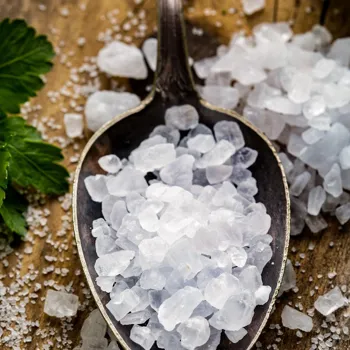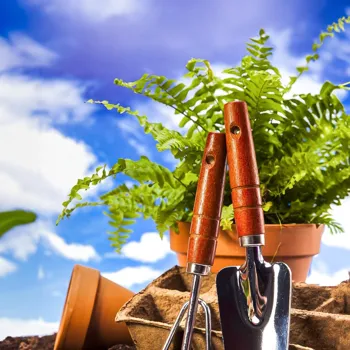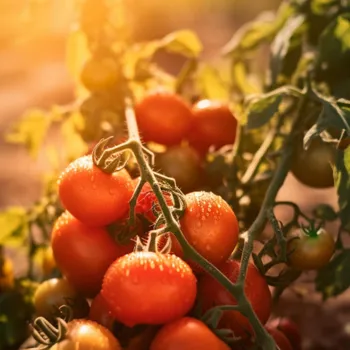Discover 10 Genius Gardening Hacks to Transform Your Plants!" Find out easy, cost-effective tips for thriving plants!
Namaste, gardening enthusiasts! Are your plants looking a little dull? Do you dream
of a lush, vibrant garden that's the envy of your neighborhood? Well, fret not!
We've got you covered with 10 ingenious gardening hacks that will breathe new life into your green babies and make them thrive like never before. These tips are easy to implement, cost-effective, and guaranteed to give your plants the boost they need.
So, grab your gardening gloves, and let's get started!
Egg-cellent Calcium Boost
Don't toss those eggshells! They are a treasure trove of calcium carbonate, an essential nutrient for plant growth. Simply crush the eggshells and sprinkle them around the base of your plants. The calcium helps strengthen cell walls, leading to healthier and more resilient plants.
Plus, eggshells can act as a natural pest deterrent, keeping slugs and snails away from your precious greens. You can also grind the eggshells into a fine powder and add it to your potting mix for an extra calcium boost.
Remember to rinse the eggshells thoroughly before crushing them to remove any lingering egg residue. Using eggshells in this manner is an organic and sustainable way to enrich your garden soil.
Banana Peel Power-Up
Forget expensive fertilizers; banana peels are your new best friend! Rich in potassium, phosphorus, and other vital nutrients, banana peels act as a natural slow-release fertilizer. Bury the peels near the roots of your plants, or soak them in water to create a nutrient-rich liquid fertilizer.
Potassium promotes strong root growth, enhances flowering, and improves overall plant health. This is especially beneficial for flowering plants like roses and tomatoes. The decomposition process releases these nutrients slowly, providing a steady supply of nourishment for your plants.
Banana peels also help to improve soil aeration and drainage. You can even add banana peels to your compost pile to enrich it with valuable nutrients.
Coffee Grounds for Acid-Loving Plants
Do you enjoy a daily cup of chai or coffee? Don't throw away those coffee grounds! Coffee grounds are slightly acidic and are fantastic for acid-loving plants like azaleas, blueberries, and roses.

Sprinkle the used coffee grounds around the base of your plants to lower the soil pH and provide essential nutrients like nitrogen. Coffee grounds also improve soil drainage and aeration, preventing the soil from becoming compacted.
Moreover, coffee grounds can deter pests such as slugs and snails due to their abrasive texture. Allow the coffee grounds to cool completely before application to avoid burning your plants.
Epsom Salt Magic
Epsom salt, or magnesium sulfate, is a secret weapon for gardeners. Magnesium is crucial for chlorophyll production, which is essential for photosynthesis. If your plants have yellowing leaves (interveinal chlorosis), it could be a sign of magnesium deficiency.

Dissolve one tablespoon of Epsom salt in a gallon of water and use it to water your plants. Epsom salt can also help improve the absorption of other nutrients from the soil. It is particularly beneficial for tomatoes, peppers, and roses.
Be careful not to overuse Epsom salt, as excessive magnesium can lead to nutrient imbalances. A monthly application is usually sufficient. Epsom salt can also help revive stressed plants after transplanting.
Cinnamon as a Natural Fungicide
Cinnamon isn't just for spicing up your chai; it's also a natural fungicide! If your seedlings are suffering from damping-off disease (a fungal infection that causes them to rot at the soil line), sprinkle a little cinnamon powder on the soil around the seedlings.
Cinnamon has antifungal properties that inhibit the growth of the fungus. You can also use cinnamon powder to treat other fungal infections on your plants.
Simply dust the affected areas with cinnamon powder or make a cinnamon tea by steeping cinnamon sticks in hot water, letting it cool, and then spraying it on your plants. Cinnamon is a safe and effective alternative to chemical fungicides. It is also a natural rooting hormone.
Aspirin for Plant Immunity
Just like humans, plants can benefit from aspirin! Aspirin contains salicylic acid, a plant hormone that boosts their immune system and helps them fight off diseases. Dissolve one uncoated aspirin tablet in a gallon of water and use it to water your plants.
Aspirin can also help plants recover from transplant shock and improve their overall health. It is particularly beneficial for tomatoes, peppers, and roses. Use this solution sparingly, as overdoing it can harm your plants. A monthly application is sufficient.
Aspirin can also help stimulate seed germination and promote flowering.
DIY Seed Starter Pots
Instead of buying expensive seed starter pots, why not make your own using readily available materials? Toilet paper rolls, egg cartons, and even newspaper can be transformed into biodegradable seed starter pots. Simply fill them with potting mix, sow your seeds, and water them regularly.

When the seedlings are ready to be transplanted, you can plant the entire pot directly into the ground, as the material will decompose over time. This is a cost-effective and environmentally friendly way to start your seeds. It also reduces transplant shock, as the roots are not disturbed.
Milk as a Mildew Fighter
Milk is not just for drinking! It can also be used as a natural fungicide to combat powdery mildew, a common fungal disease that affects many plants. Mix equal parts milk and water and spray the solution on your plants.
The proteins in milk have antifungal properties that inhibit the growth of powdery mildew. Repeat the application every 7-10 days until the problem is resolved. Milk is a safe and effective alternative to chemical fungicides. Use fresh milk for best results.
Skim milk is just as effective as whole milk.
Baking Soda for Sweet Tomatoes
Baking soda can make tomatoes sweeter. Lightly dust the soil around the tomato with baking soda. This reduces the acidity of the soil, which improves the sweetness of the tomato. However, do not apply it too much as it will increase the alkalinity of the soil.

Rice Water Remedy: A Hidden Gem: After rinsing rice, don't discard that water. Rice water contains vitamins and mineral which are essential for plant growth. Use rice water to water your indoor and outdoor plants This method boost growth and promote healthy leaves.
It can also improve the soil life.
So there are 10 innovative gardening hacks that you can implement easily. Happy gardening, folks! May your gardens bloom with abundance and joy!
These hacks will help you keep your plants healthy.











